Mental Health 2019 – Transition, Planning And Delivery - A Report From Derek Maylor
The NHS Long Term Plan included the largest transformation of mental health care ever known and was published last July following on from Five-Year Forward View for Mental Health in 2016 (1) to take on an additional 1 million people.
Following on from previous reports to the Branch these are opportunities for unions to influence health providers such as NHS England, Health Education England, Care Quality Commission, Public Health England, Dept of Health and NHS Digital. Mental health services will grow faster than the overall NHS budget with a ringfenced investment worth at least £2.3 billion a year for mental health services by 2023/24. Much of the mental ill health is caused in or by the workplace and it is essential that this is given the same attention as a worker being injured.
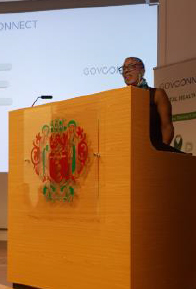 Jacqui Dyer MBE chaired the event. Jacqui has worked with a wide range of vulnerable care groups and has a strong passion in grass roots community empowerment and is an appointed member of the Ministerial Advisory Group for Mental Health and a Lambeth Labour Councillor where she is cabinet member for health and adult social care.
Jacqui Dyer MBE chaired the event. Jacqui has worked with a wide range of vulnerable care groups and has a strong passion in grass roots community empowerment and is an appointed member of the Ministerial Advisory Group for Mental Health and a Lambeth Labour Councillor where she is cabinet member for health and adult social care.
Mental health is in a good place, but we must keep it going cultivating a culture of reality and equality working together – however you do not have to be a fully trained clinician to help people.
 Duncan Selbie who is the Chief Executive, Public Health England (2) and was the first speaker.
Duncan Selbie who is the Chief Executive, Public Health England (2) and was the first speaker.
It is not just about improving mental health services and despite some improvements in funding the poorest in society are still at the same stage as thirty years ago and the gap is increasing between them and those who are more affluent, basically those who are richer have better mental health.
The biggest determination of mental health is income though friendships and companionships are huge also.
Over the last few years we have halved the number of smokers but we have doubled the amount of people over height so there are consequences to political actions. Three things are needed for the average individual to have sustainable good mental health, a job, a home and a friend. Social connections are more important than any doctor.
There will be a new campaign commencing in October from PHE on mental health in the workplace the workplace.
 Andrew Herd is the Mental Health Lead at the Dept of Health & Social Care and has specialised in mental health policy for that past six years; recently he led the Cross-Government Suicide Prevention Strategy and implementing the Cross-Government Suicide Prevention Workplan.
Andrew Herd is the Mental Health Lead at the Dept of Health & Social Care and has specialised in mental health policy for that past six years; recently he led the Cross-Government Suicide Prevention Strategy and implementing the Cross-Government Suicide Prevention Workplan.
There are opportunities for cross government benefits in addressing mental health and there are currently multiple ongoing programmes in the FYFW “future in mind” for young people. There will be an independent review of the Mental Health Act before the end of the year and a White Paper.
The Minister for Suicide Prevention, Jackie Doyle-Price MP, is the first (probably) in the world. Poor ill mental health is usually multi-layered and it’s the aggregation that tips the scale.
There are 30 suicides a day in England alone. Importantly having a safe and secure home is not provided by a doctor but it is essential to good meatal health.

Richard Andrews is CEO of Healios (3) and the healthcare advisor to The Economist, winner of ‘Best UK Mental Health Executive Award’ and ‘Excellence Award for Suicide Prevention Initiative.’ Mental health care can be delivered through technology; helping people with mental illness or neurodevelopmental conditions, families and carers providing a better quality of life.
Some of his main issues were:
• services are at breaking point as demand for care rises
• system is geared up for providing diagnosis not addressing the needs of the young
• families need choices to receive the care they need where and when they need it
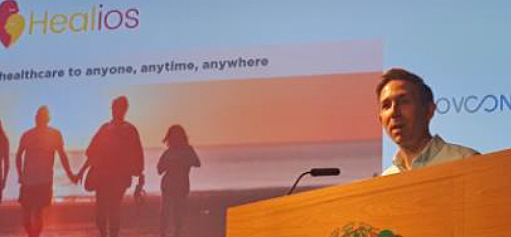
Family support is essential to mental health, so we need to redesign services to future proof neurodevelopmental conditions for that family and further develop a therapeutic alliance between all agencies. As unions though we have questions, what is being done by government to alleviate and remove bullying in the workplace? What about the call centre environment for our members? What about the horror stories from dispatch warehouses?
The HSEs Stress Management Standards are brilliant but these are not needed by good employers and they are ignored by bad employers. How can cuts to the HSE and LA’s frontline enforcement inspectors make the workplace better?
 Professor Lisa Bayliss-Pratt is the Chief Nurse, Health Education England (4) & and Programme Lead and spoke about transforming mental health services. Lisa created the three-tiered dementia education and training framework which trained 100,000 NHS personnel in dementia awareness. Health Education England mental health report (10) showed the need to increase capacity and capability of the workforce by development and rewards with a person-centred approach not a statistical one.
Professor Lisa Bayliss-Pratt is the Chief Nurse, Health Education England (4) & and Programme Lead and spoke about transforming mental health services. Lisa created the three-tiered dementia education and training framework which trained 100,000 NHS personnel in dementia awareness. Health Education England mental health report (10) showed the need to increase capacity and capability of the workforce by development and rewards with a person-centred approach not a statistical one.
 Jane Ray is Head of Hospital Inspections (Mental Health), Care Quality Commission (5) and talked about key findings form recent CQC inspections that have set priorities for the year ahead. Many mental ill health wards are stuck in the 80s with dormitories that should be gone still being used, there are concerns over sexual safety etc, patients can be many miles from their homes and families.
Jane Ray is Head of Hospital Inspections (Mental Health), Care Quality Commission (5) and talked about key findings form recent CQC inspections that have set priorities for the year ahead. Many mental ill health wards are stuck in the 80s with dormitories that should be gone still being used, there are concerns over sexual safety etc, patients can be many miles from their homes and families.
We need to review staff intervention and restraint with better guidelines to get it right.
One of the unusual attendees’ backgrounds, not just a Trade Union rep, was Ian Binns who came from nuclear and aerospace industries and is now Head of Information (Community & Mental Health), NHS Digital (6).
He gave an overview of what type of mental health data is collected, the range of providers that submit mental health data and the types of analysis that can then be used to improve care. The NHS collects lots of data for analysis, so evidence-based decision-making is at the heart of everything. CWU could use this approach more for targeting i.e. who are our activists and where do we have holes? Ethnicity? Age? Gender etc.
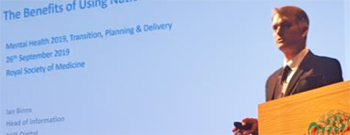 The NHS is using the Bring Your Own Data (BYOD) more and more to create a personalised strategy to connect with patients all under the Data Protection Act. There is strong evidence that physical health and mental health go hand in hand and staff must be supported not just patients.
The NHS is using the Bring Your Own Data (BYOD) more and more to create a personalised strategy to connect with patients all under the Data Protection Act. There is strong evidence that physical health and mental health go hand in hand and staff must be supported not just patients.
The excellently named James de Bathe is Director of Partnerships at Ieso Digital Health (7) elaborated about online cognitive behavioural therapy which can help patients access support in a timelier manner. It works with a mix of third and public sector organisations, supporting people in both health and social care. Some patients prefer on-line to face to face treatment and support but demand is bigger than supply and we can not currently shift the through-put, conversely we keep adding to the waiting list we cannot keep squeezing the tube at both ends but need more prioritising those specialists to best utilise their skills to support them and improve outcomes.
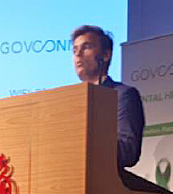 Jenny Mace from Home Group (8) is strategic lead for learning disabilities has 30 years’ experience working in social care, youth work, criminal justice, homelessness and mental health. People, families and communities are non-judgemental and focus on skills and support. Organisations like the CWU can support members, not like the NHS but a union health service. It’s about what matters to the member not what is the matter with the member.
Jenny Mace from Home Group (8) is strategic lead for learning disabilities has 30 years’ experience working in social care, youth work, criminal justice, homelessness and mental health. People, families and communities are non-judgemental and focus on skills and support. Organisations like the CWU can support members, not like the NHS but a union health service. It’s about what matters to the member not what is the matter with the member.
 Dr David Smart is Clinical Director ate the General Practice Alliance and he focussed on depression and a trial that brought social and health care together to develop a High Value Integrated Depression Pathway (HVIDP; adding NICE expert reference group developed framework for community mental health support for adults and the elderly.
Dr David Smart is Clinical Director ate the General Practice Alliance and he focussed on depression and a trial that brought social and health care together to develop a High Value Integrated Depression Pathway (HVIDP; adding NICE expert reference group developed framework for community mental health support for adults and the elderly.
One in six people in the UK have an issue with depression, maybe not themselves but a close family member, much of this is self-medicated such as going out and getting drunk. Depression is the main cause of workplace absence. The area needs joining up and integrating between GPs and LA’s Social Services. Integrated Depression Pathway meaning a GP will guide the patient to free courses at the gym, routes for walks to go on with local ramblers and so on, this is called Social Prescribing.
The rest of the day split in to three separate plenaries sessions, “complex mental health supported living in a public private partnership”; and “improving mental health by identifying and treating problem gamblers” and the one I thought most relevant “challenging the model: prevention vs cure in mental health”. The discussion was on how the model of mental health support needs to change and implementation of the recommendations made within the NHS Long Term Plan and the NHS Five Year Forward View Strategy.
Gregor Henderson, the National Lead for Mental Health and Wellbeing for PHE, opened the session. PHE is the national agency responsible for protecting and improving the public’s health and reducing health inequalities, to make mental health better for everyone wherever they live or work.
Janet Ince is Mental Health Transformation Manager for Central Lancashire Clinical Commissioning Group and formerly with Lancashire Constabulary also the Care Quality Commission. Henry Jones CEO at Big White Wall (9)
Dr. Tim Rogers is a medical doctor and consultant psychiatrist to athletes in high performance sport and elite dance. He regularly consults across a wide variety of sports, including Premier League football, Premiership Rugby and those in the Olympic and Paralympic systems. In addition to this, he is a specialist member of the Sport Resolutions’ National Anti-Doping Panel.
Dr Phil Moore, Deputy Chair (Clinical) at NHS Kingston CCG, is a long-standing and enthusiastic GP committed to transforming the NHS; he is on the Board of NHS Clinical Commissioners and chairs the Mental Health Commissioners’ Network. The session was on the commissioning mental health services at place and challenges to improving mental health services.
 Improvements are coming but too slow, at least we’re on the right pathway (that’s a small NHS joke). There must be a change from “I’m ill I’ll go to the doctors” there’s more to health care than pills and medicine.
Improvements are coming but too slow, at least we’re on the right pathway (that’s a small NHS joke). There must be a change from “I’m ill I’ll go to the doctors” there’s more to health care than pills and medicine.
BWW online community is monitored 24/7 for early stage catching people before they fall by spotting trends and comments, even tones in the voice. Teo thirds of people who use the platform have never discussed their depression with anyone else. BWW is used by lots of ex-military. Anonymity can be vital when some people get told just to “man-up” or “grow a pair”. It’s a myth that things are 1 to 1 – far more important is the whole environment like the employer’s culture.
Phoebe Robinson is head of mental health at NHS England and coordinates the 5 Year Forward View for mental health. I liked that everything must be “evidence based” care across the NHS, including mental health.
The NHS in the regions uses charity and third sector to specialise, every Primary Network will have a Social Provider like Action for Happiness (11) which is a charity that looks at “happiness” to bring together like-minded people then support them in taking practical action to build a happier and more caring society. NHS commissioning is changing but will still need to design and deliver best care for people and work with all sectors in their locality. Health and social care will need to be merged and shared delivery – why would anyone even think of designing and implementing a service without first asking those who need to use it what they want? However, it is odd that in 2019 even the NHS will point people to SAMs or MIND when someone is in a mental health crisis, it’s the voluntary sector that step up.
There is a ring-fenced £2.3B this year to 2024 for mental health sending and some of this will be on education, levelling mental health with physical health; eventually there will be a Community Perinatal Mental Health Service in every STP.
The last session was on children and young people’s mental health led by Emma Thomas from Young Minds formerly at Barnardo’s and the YMCA. Our young people (medically this is up to aged 25) are putting more and more pressure on services, the demand has referrals has gone up by 45% in the last two years alone. We must provide this whatever the cost, so we will look wider than the NHS, to schools, in communities and widening the scope of current NHS professionals.
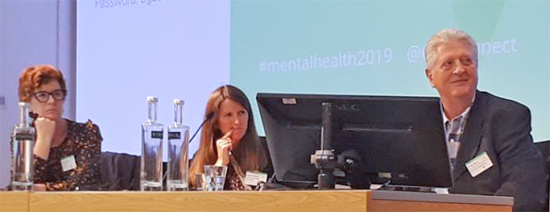
I questioned about our increasingly pressurised work environments such as BT’s Lancaster House which I named, similar issues in RMG and our call centres. All companies have good policies in place but problem is not that they are not adhered to, they are completely ignored by many managers. www.unionsafety.eu
Page 6 of 6
I will be able to access their website to get further information and resources, as well as information and guidance on current and future strategies from the UK’s leading authorities which the Branch could use to coordinate campaigns for example or look for best practice approaches from the most successful projects from other businesses.
This was, and remains, an opportunity to understand what strategies affect members and even influencing future Government policy.
Again, a very long day and it closed with coffee and a further opportunity to mention the CWU and trade unions generally who are concerned that workplace mental ill health. The delegates rate for public sector was £354:00 so the free invite was welcome.
Derek Maylor – 8th. October 2019

References:
1 www.longtermplan.nhs.uk/wp-content/uploads/2019/07/nhs-mental-health-implementation-plan-2019-20-2023-24.pdf
2 www.gov.uk/government/organisations/public-health-england/about
3 www.healios.org.uk/
4 www.hee.nhs.uk/
5 www.cqc.org.uk/
6 https://digital.nhs.uk/
7 www.iesohealth.com/en-gb
8 www.homegroup.org.uk/
9 www.bigwhitewall.com/
10 ww.hee.nhs.uk/our-work/mental-wellbeing-report
11 www.actionforhappiness.org/
RSM MH 1019

